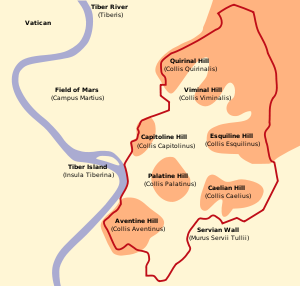- Seven hills of Rome
-
The Seven Hills of Rome (Italian: Sette colli di Roma) east of the river Tiber form the geographical heart of Rome, within the walls of the ancient city.
The seven hills are:
- Aventine Hill (Latin, Aventinus; Italian, Aventino)
- Caelian Hill (Caelius, Celio)
- Capitoline Hill (Capitolinus, Capitolino/Campidoglio)
- Esquiline Hill (Esquilinus, Esquilino)
- Palatine Hill (Palatinus, Palatino)
- Quirinal Hill (Quirinalis, Quirinale)
- Viminal Hill (Viminalis, Viminale)
The original city was held by tradition to have been founded by Romulus on the Palatine Hill.
The seven hills of early Rome – the Cermalus, Palatium, and Velia (the three peaks of the Palatine Hill), the Cispius, Fagutalis, and Oppius (the three peaks of the Esquiline Hill), and the Sucusa – figured prominently in Roman mythology, religion, and politics.[clarification needed]
Tradition holds that the seven hills were first occupied by small settlements and not grouped or recognized as a city called Rome. The denizens of the seven hills began to participate in a series of religious games, which started to bond the groups. The city of Rome, thus, came into being as these separate settlements acted as a group, draining the marshy valleys between them and turning them into markets and fora.
Of the seven hills of current Rome, five (Aventine, Caelian, Esquiline, Quirinal, and Viminal hills) are populated with monuments, buildings, and parks. The Capitoline now hosts Rome's city hall, and the Palatine Hill is an archaeological area.
The now-famous Vatican Hill (Latin Collis Vaticanus) is northwest of the Tiber and is not one of the Seven Hills of Rome. Likewise, the Pincian Hill (Latin Mons Pincius), to the north, and the Janiculum Hill (Latin Ianiculum), to the west, are not counted among the traditional Seven Hills.
See also
- List of cities claimed to be built on seven hills
- Seven hills
- Cispian Hill (Cispio)
- Janiculum Hill (Gianicolo)
- Monte Mario
- Oppian Hill (Oppio)
- Pincian Hill (Pincio)
- Vatican Hill (Vaticano)
- Velian Hill (Velia)
References
Categories:- Seven hills of Rome
- Cultural lists
Wikimedia Foundation. 2010.

